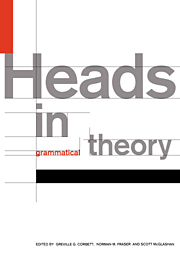Book contents
- Frontmatter
- Contents
- List of contributors
- 1 Introduction
- 2 The head of Russian numeral expressions
- 3 The phonology of heads in Haruai
- 4 Patterns of headedness
- 5 Head-hunting: on the trail of the nominal Janus
- 6 The headedness of noun phrases: slaying the nominal hydra
- 7 Head- versus dependent-marking: the case of the clause
- 8 Heads in discourse: structural versus functional centricity
- 9 Heads in Head-driven Phrase Structure Grammar
- 10 Heads and lexical semantics
- 11 Heads, parsing and word-order universals
- 12 Do we have heads in our minds?
- 13 Heads, bases and functors
- References
- Index
10 - Heads and lexical semantics
Published online by Cambridge University Press: 23 February 2010
- Frontmatter
- Contents
- List of contributors
- 1 Introduction
- 2 The head of Russian numeral expressions
- 3 The phonology of heads in Haruai
- 4 Patterns of headedness
- 5 Head-hunting: on the trail of the nominal Janus
- 6 The headedness of noun phrases: slaying the nominal hydra
- 7 Head- versus dependent-marking: the case of the clause
- 8 Heads in discourse: structural versus functional centricity
- 9 Heads in Head-driven Phrase Structure Grammar
- 10 Heads and lexical semantics
- 11 Heads, parsing and word-order universals
- 12 Do we have heads in our minds?
- 13 Heads, bases and functors
- References
- Index
Summary
Introduction
This chapter discusses the syntactic and semantic relations between the ‘head of a phrase’ and the phrase itself. In particular, the phrase is a ‘kind of the head since the latter provides both the semantic and syntactic type of the phrase (Hudson, 1987: 115–16). For example, the noun can be treated as head in noun phrases and its systematic priority over other categories in the phrase, such as adjectives and determiners, is manifest in the syntactic and semantic type of the phrase.
There are three reasons for discussing these syntactic and semantic relations. The first is to introduce a unification framework which characterizes them in terms of a dependency approach to combination: categories in a binary phrase are combined as ‘head’ and ‘modifier’ (or ‘dependent’) (Hays, 1964; Anderson, 1977: 92–100; Hudson, 1984: 75–9; Miller, 1985: 25–31). The second reason is to show that this framework provides a better account of these relations than frameworks where categories are combined as functor and argument (Ajdukiewicz, 1935; Vennemann and Harlow, 1977; Flynn, 1983; Calder et aL, 1987; Zeevat, 1988). The third-and most important – reason is to introduce evidence which demonstrates that the semantic relations between heads and phrases are not necessarily transparent: the phrase can exhibit semantic properties which conflict with those of the head. This evidence leads to a revision of the framework where semantic conflicts are resolved on the basis of the head-modifier distinction.
The Head-Modifier Principle
The framework adopted is a unification grammar in which categories combine as head and modifier to yield a result category for the phrase.
- Type
- Chapter
- Information
- Heads in Grammatical Theory , pp. 204 - 230Publisher: Cambridge University PressPrint publication year: 1993
- 2
- Cited by



